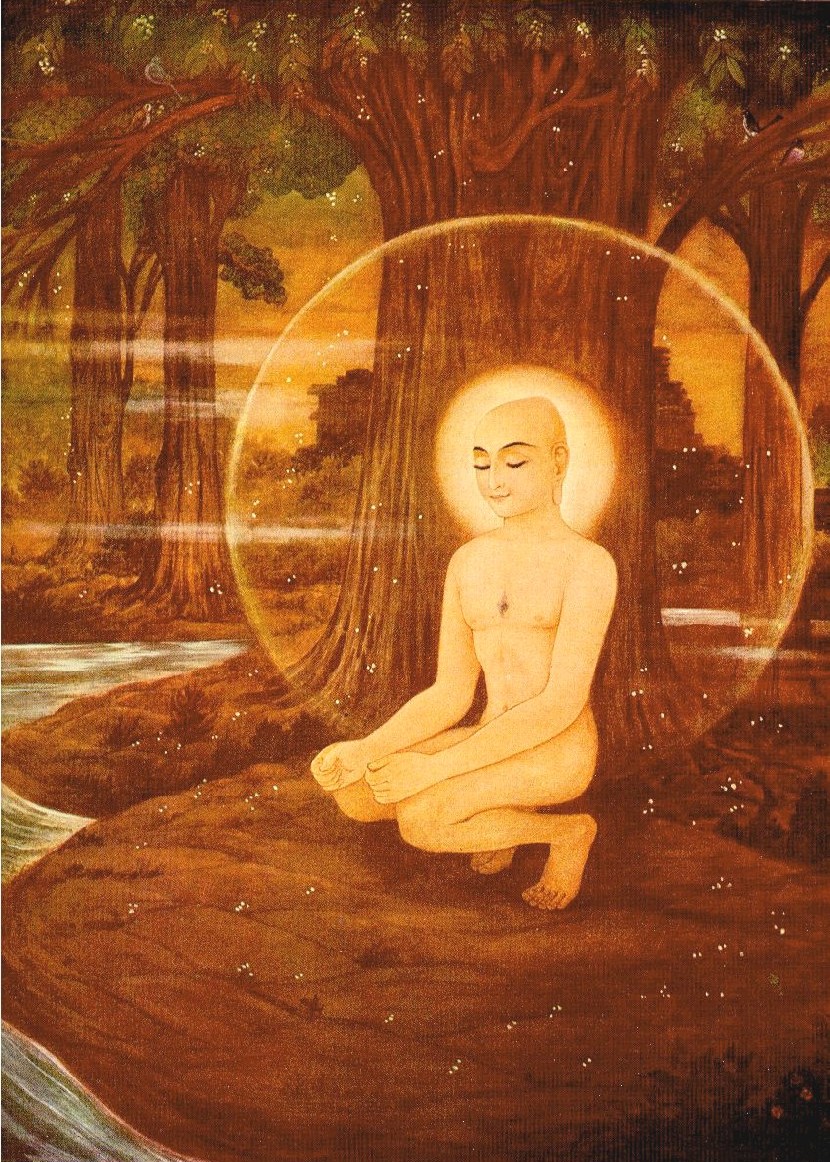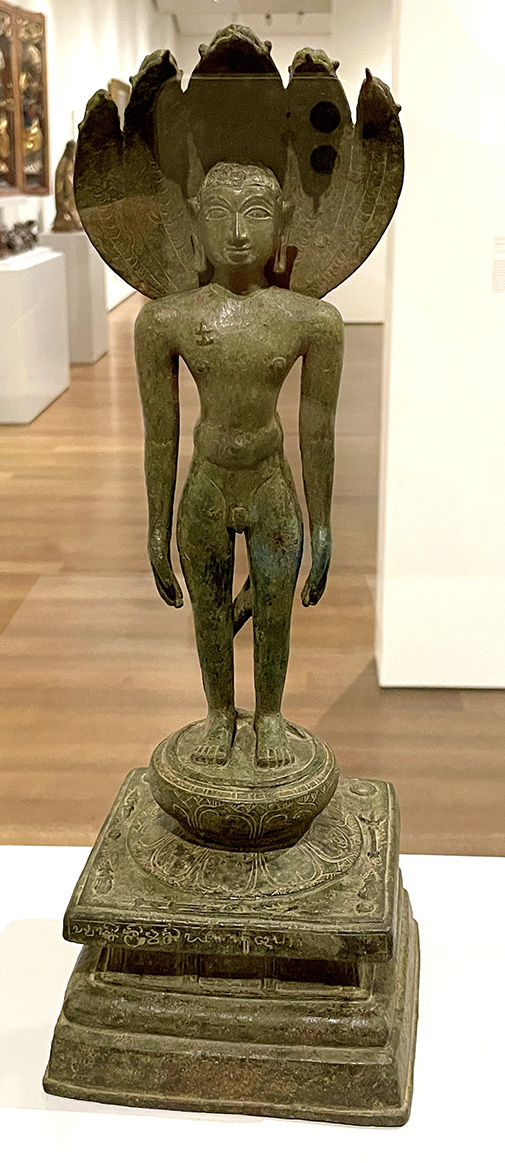Difference between revisions of "Jainism"
Occultwiki (talk | contribs) (Created page with "350px|thumb|The Mahavira at the moment of enlightenment '''Jainism''', also known as '''Jain Dharma''', is an Indian religion. Jainism traces...") |
Occultwiki (talk | contribs) |
||
| Line 2: | Line 2: | ||
'''Jainism''', also known as '''Jain Dharma''', is an Indian religion. Jainism traces its spiritual ideas and history through the succession of twenty-four tirthankaras (supreme preachers of Dharma), with the first in the current time cycle being Rishabhadeva, whom the tradition holds to have lived millions of years ago. More recent innovators of the faith were the twenty-third tirthankara Parshvanatha, whom historians date to the 9th century BCE, and the twenty-fourth tirthankara Mahavira, around 600 BCE. | '''Jainism''', also known as '''Jain Dharma''', is an Indian religion. Jainism traces its spiritual ideas and history through the succession of twenty-four tirthankaras (supreme preachers of Dharma), with the first in the current time cycle being Rishabhadeva, whom the tradition holds to have lived millions of years ago. More recent innovators of the faith were the twenty-third tirthankara Parshvanatha, whom historians date to the 9th century BCE, and the twenty-fourth tirthankara Mahavira, around 600 BCE. | ||
All four Dharmic religions | All four Dharmic religions (Jainism, [[Hinduism]], Sikhism, and [[Buddhism]]) have some similarities in concepts and doctrines such as karma and rebirth. | ||
Jainism is considered to be an eternal dharma with the tirthankaras guiding every time cycle of the cosmology. The three main pillars of Jainism are ''ahiṃsā'' (non-violence), ''anekāntavāda'' (non-absolutism), and ''aparigraha'' (asceticism). | Jainism is considered to be an eternal dharma with the tirthankaras guiding every time cycle of the cosmology. The three main pillars of Jainism are ''ahiṃsā'' (non-violence), ''anekāntavāda'' (non-absolutism), and ''aparigraha'' (asceticism). | ||
Revision as of 16:05, 11 January 2024
Jainism, also known as Jain Dharma, is an Indian religion. Jainism traces its spiritual ideas and history through the succession of twenty-four tirthankaras (supreme preachers of Dharma), with the first in the current time cycle being Rishabhadeva, whom the tradition holds to have lived millions of years ago. More recent innovators of the faith were the twenty-third tirthankara Parshvanatha, whom historians date to the 9th century BCE, and the twenty-fourth tirthankara Mahavira, around 600 BCE.
All four Dharmic religions (Jainism, Hinduism, Sikhism, and Buddhism) have some similarities in concepts and doctrines such as karma and rebirth.
Jainism is considered to be an eternal dharma with the tirthankaras guiding every time cycle of the cosmology. The three main pillars of Jainism are ahiṃsā (non-violence), anekāntavāda (non-absolutism), and aparigraha (asceticism).
Origin
Jainism is an ancient Indian religion of obscure origins.
The 23rd Tirthankara, Parshvanatha, was a historical being, dated by the Jain tradition to the ninth century BCE; historians date him to the eighth or seventh century BC. Mahāvīra is considered a contemporary of the Buddha, in around the sixth century BCE. The interaction between the two religions began with the Buddha; later, they competed for followers and the merchant trade networks that sustained them. Buddhist and Jain texts sometimes have the same or similar titles but present different doctrines.
Conception of the divine
Jainism is a transtheistic religion, although from a theological point of view, it is atheist. It holds that the universe was not created, and will exist forever. It is independent, having no creator, governor, judge, or destroyer In this, it is unlike the Abrahamic religions and the theistic strands of Hinduism, but similar to Buddhism.
However, Jainism believes in the world of heavenly and hellish beings who are born, die and are reborn like earthly beings. The souls who live happily in the body of a heavenly celestial do so because of their positive karma. It is further stated that they possess a more transcendent knowledge about material things and can anticipate events in the human realms. However, once their past karmic merit is exhausted, it is explained that their souls are reborn again as humans, animals or other beings.
The perfect enlightened souls with a body are called Arihants (victors) and perfect souls without a body are called Siddhas (liberated souls). Only a soul with human body can attain enlightenment and liberation. The liberated beings are the supreme beings and are worshipped by all heavenly, earthly and hellish beings who aspire to attain liberation themselves.
The Five Vows
Jainism teaches five ethical duties, which it calls five vows. These are called anuvratas (small vows) for Jain laypersons, and mahavratas (great vows) for Jain mendicants. For both, its moral precepts preface that the Jain has access to a guru (teacher, counsellor), deva (Jina, god), doctrine, and that the individual is free from five offences: doubts about the faith, indecisiveness about the truths of Jainism, sincere desire for Jain teachings, recognition of fellow Jains, and admiration for their spiritual pursuits. Such a person undertakes the following Five vows of Jainism:
- Ahiṃsā, "intentional non-violence" or "noninjury": The first major vow taken by Jains is to cause no harm to other human beings, as well as all living beings (particularly animals). This is the highest ethical duty in Jainism, and it applies not only to one's actions, but demands that one be non-violent in one's speech and thoughts.
- Satya, "truth": This vow is to always speak the truth. Neither lie, nor speak what is not true, and do not encourage others or approve anyone who speaks an untruth.
- Asteya, "not stealing": A Jain layperson should not take anything that is not willingly given. Additionally, a Jain mendicant should ask for permission to take it if something is being given.
- Aparigraha, "non-possessiveness": This includes non-attachment to material and psychological possessions, avoiding craving and greed. Jain monks and nuns completely renounce property and social relations, own nothing and are attached to no one.
- Brahmacharya, "celibacy": Abstinence from sex and sensual pleasures is prescribed for Jain monks and nuns. For laypersons, the vow means chastity, faithfulness to one's partner.
Asceticism
Of the major Indian religions, Jainism has had the strongest ascetic tradition. Ascetic life may include nakedness, symbolizing non-possession even of clothes, fasting, body mortification, and penance, to burn away past karma and stop producing new karma, both of which are believed essential for reaching siddha and moksha ("liberation from rebirths" and "salvation").
Jain texts like Tattvartha Sūtra and Uttaradhyayana Sūtra discuss austerities in detail. Lists of internal and external austerities vary with the text and tradition. Asceticism is viewed as a means to control desires, and to purify the jiva (soul). The tirthankaras such as the Mahāvīra set an example by performing severe austerities for twelve years.
Jain monastic rules have encouraged the use of mouth cover, as well as the Dandasan – a long stick with woolen threads – to gently remove ants and insects that may come in their path.
Diet
The practice of non-violence towards all living beings has led to Jain culture being vegetarian. Devout Jains practice lacto-vegetarianism, meaning that they eat no eggs, but accept dairy products if there is no violence against animals during their production. Veganism is encouraged if there are concerns about animal welfare. Jain monks, nuns and some followers avoid root vegetables such as potatoes, onions, and garlic because tiny organisms are injured when the plant is pulled up, and because a bulb or tuber's ability to sprout is seen as characteristic of a higher living being.
Jain monks and advanced laypeople avoid eating after sunset, observing a vow of ratri-bhojana-tyaga-vrata. Monks observe a stricter vow by eating only once a day.
Meditation
Jainism considers meditation (dhyana) a necessary practice, but its goals are very different from those in Buddhism and Hinduism. In Jainism, meditation is concerned more with stopping karmic attachments and activity, not as a means to transformational insights or self-realization in other Indian religions.
Jain meditation is also referred to as Sāmāyika which is done for 48 minutes in peace and silence. A form of this which includes a strong component of scripture study is mainly promoted by the Digambara tradition of Jainism. The word Sāmāyika means "being in the moment of continuous real-time."
Jains believe meditation has been a core spiritual practice. All the twenty-four Tirthankaras practiced deep meditation and attained enlightenment. They are all shown in meditative postures in images and idols. Mahavira practiced deep meditation for twelve years and attained enlightenment. The Acaranga Sutra dating to 500 BCE, addresses the meditation system of Jainism in detail.
The 24 Tirthankaras are almost always seen in one of two postures in the Kayotsarga (standing) or Padmasana/Paryankasana (Lotus).
Sects
The Jain community is divided into two major denominations, Digambara and Śvētāmbara. Monks of the Digambara (sky-clad) tradition do not wear clothes. Female monastics of the Digambara sect wear unstitched plain white sarees and are referred to as Aryikas. Śvētāmbara (white-clad) monastics, on the other hand, wear seamless white clothes.
Global population
The majority of Jains currently reside in India. With four to five million followers worldwide, Jainism is small compared to major world religions. Jains form 0.37% of India's population, mostly in the states of Maharashtra (1.4 million in 2011), Rajasthan (13.97%), Gujarat (13.02%) and Madhya Pradesh (12.74%). Significant Jain populations exist in Karnataka (9.89%), Uttar Pradesh (4.79%), Delhi (3.73%) and Tamil Nadu (2.01%).
Outside India, Jain communities can be found in most areas hosting large Indian populations, such as Europe, the United Kingdom, the United States, Canada, Australia and Kenya. Jainism also counts several non-Indian converts; for example, it is spreading rapidly in Japan, where more than 5,000 families have converted between 2010 and 2020.
According to the National Family Health Survey (NFHS-4) conducted in 2015–16, Jains form the wealthiest community in India.

